BusinessEurope Headlines No. 2018-19
Pierre Gattaz to succeed Emma Marcegaglia as President of BusinessEurope

During its meeting in Sofia on 18 May, the Council of Presidents of BusinessEurope unanimously elected Pierre Gattaz, current President of the French business federation MEDEF and CEO of Radiall, to succeed Emma Marcegaglia as President of BusinessEurope from 5 July 2018. He is elected for a period of two years, renewable once. Marcegaglia said: “I am delighted that Pierre Gattaz will succeed me on 5 July 2018. He is a successful entrepreneur and a convinced European. With his experience in a national member federation and in international fora such as the B7 and B20, he is the President that BusinessEurope needs in times of rising international tensions”. Gattaz stated: “I will do my utmost to fulfil the expectations of the 39 member federations of BusinessEurope. Taking up this important responsibility is an honour and a challenge. Emma Marcegaglia has set the bar very high and we are at a turning point in the global economic order. European business has to speak up. I am looking forward to contributing to increasing employment and growth across Europe and will fight protectionism with all my determination.” See Pierre Gattaz' biography here.
Contact: Daniele Olivieri
Photo copyright: Christophe Guibbaud
Video message on circular economy
The 2018 Green Week has almost come to an end. Exactly one year ago at the Green Week’s 2017 edition, BusinessEurope’s Director General Markus J. Beyrer launched the Circular Economy Industry Platform (www.circulary.eu) together with European Commissioners Vella (environment) and Thyssen (social). It now showcases more than 125 examples on how EU business adds to the circular economy and what challenges it faces to become even more circular. To celebrate the platform’s 1-year anniversary, we created this video.
Contact: Leon de Graaf
Making improved data protection a reality

Today the General Data Protection Regulation (GDPR) came into force - the largest change in data protection law Europe has ever seen. The European Union is leading the way to set the global gold standard for data protection. BusinessEurope has fully supported the aim of creating a harmonised approach to EU data protection. However, today is just the beginning as now the real follow-up has to be done by national regulators to ensure harmonised application of these rules.
Also, in our own activities we take data protection very seriously. As explained in our email yesterday, we have taken the necessary steps to ensure compliance with the new GDPR legal requirements and we invite you to have a look at our revised privacy policy which provides a clear understanding of how we collect, use, process and handle personal data. For example, to exercise your rights in respect of your personal information, or if you have any questions, complaints or queries about how we use your information, you can contact us directly at privacy@businesseurope.eu. And, if you are registered to this newsletter and wish to unsubscribe, you can easily do so by simply clicking on the unsubscribe button at the bottom of this newsletter in the email version or sending us an email to privacy@businesseurope.eu.
European Business Summit: EU unity needed to overcome international challenges
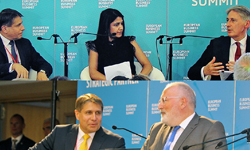 “The current trade and investment climate in Europe is positive. However, there are many international uncertainties. The challenge now is to find answers to alleviate those risks”, said BusinessEurope Director General Markus J. Beyrer during the plenary session of the European Business Summit (EBS) on 23 May in Brussels. European Commission First Vice-President Frans Timmermans, Tata Consultancy CEO N. Ganapathy Subramarian, and the President of the Federation of Enterprises in Belgium, Bernard Gilliot, also joined the debate, which was later completed by Lilyana Pavlova, Minister for the Bulgarian Presidency of the Council of the EU. “We are in a phase when it will be decided if we shape globalisation or if others will shape it. In this crucial time we need to show European unity”, Beyrer added. He also joined the EBS Closing Plenary on the following day, when Brexit was the main topic discussed. Following the keynote speech of the UK Chancellor of the Exchequer Philip Hammond, he recalled that BusinessEurope and its member federations were instrumental in facilitating a political agreement on a status quo-like transition period to avoid a cliff-edge Brexit. "We are ready to continue playing a constructive role in the next phase of the negotiations. Time is running out and we need a full agreement on the proposed legal text covering the withdrawal and the transition issues. We also need more clarity on the future relationship", Beyrer said.
“The current trade and investment climate in Europe is positive. However, there are many international uncertainties. The challenge now is to find answers to alleviate those risks”, said BusinessEurope Director General Markus J. Beyrer during the plenary session of the European Business Summit (EBS) on 23 May in Brussels. European Commission First Vice-President Frans Timmermans, Tata Consultancy CEO N. Ganapathy Subramarian, and the President of the Federation of Enterprises in Belgium, Bernard Gilliot, also joined the debate, which was later completed by Lilyana Pavlova, Minister for the Bulgarian Presidency of the Council of the EU. “We are in a phase when it will be decided if we shape globalisation or if others will shape it. In this crucial time we need to show European unity”, Beyrer added. He also joined the EBS Closing Plenary on the following day, when Brexit was the main topic discussed. Following the keynote speech of the UK Chancellor of the Exchequer Philip Hammond, he recalled that BusinessEurope and its member federations were instrumental in facilitating a political agreement on a status quo-like transition period to avoid a cliff-edge Brexit. "We are ready to continue playing a constructive role in the next phase of the negotiations. Time is running out and we need a full agreement on the proposed legal text covering the withdrawal and the transition issues. We also need more clarity on the future relationship", Beyrer said.
Contact: Jasmin Ploner
BusinesssEurope speaks up in defence of multilateral rules-based trade
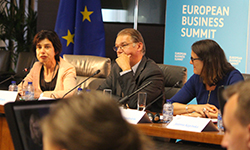 “The multilateral trading system is placed under pressure but European business remains committed to international rules and an ambitious trade agenda that promotes market diversification”, said Luisa Santos, Director of International Relations during a panel at the European Business Summit on 24 May in Brussels. During the two-day event, Santos spoke on a number of panels related to trade and shared key points with the audience. During a panel on new trade opportunities, she mentioned that the World Trade Organisation (WTO) is at cross-roads where its members will have to take some difficult decisions on the way forward, though the situation also presents an opportunity to fix some longstanding issues that have accumulated over time. WTO members are divided on how to take international economic cooperation forward, however, and China’s Belt and Road Initiative (BRI) is both an example of economic opportunity and of a risk of undermining international rules and norms. “Figures show that European companies are scarcely involved in BRI projects to date. In order to make this a truly open initiative, China should embrace international rules on financing, as well as more transparency on how to get involved, and abide by key principles on public procurement to allow companies to compete on a level playing field”, Santos said during a panel on China’s BRI. ‘The EU’s trade agenda shows furthermore that advancing bilateral agreements with key partners such as Japan, with market liberalisation, strong rules on procurement, intellectual property protection, and the removal of non-tariff measures, the EU will be able to work with like-minded partners to create stepping stones to eventually strengthen the multilateral trading system.”, she concluded, during a panel on the benefits of the EU-Japan free trade agreement.
“The multilateral trading system is placed under pressure but European business remains committed to international rules and an ambitious trade agenda that promotes market diversification”, said Luisa Santos, Director of International Relations during a panel at the European Business Summit on 24 May in Brussels. During the two-day event, Santos spoke on a number of panels related to trade and shared key points with the audience. During a panel on new trade opportunities, she mentioned that the World Trade Organisation (WTO) is at cross-roads where its members will have to take some difficult decisions on the way forward, though the situation also presents an opportunity to fix some longstanding issues that have accumulated over time. WTO members are divided on how to take international economic cooperation forward, however, and China’s Belt and Road Initiative (BRI) is both an example of economic opportunity and of a risk of undermining international rules and norms. “Figures show that European companies are scarcely involved in BRI projects to date. In order to make this a truly open initiative, China should embrace international rules on financing, as well as more transparency on how to get involved, and abide by key principles on public procurement to allow companies to compete on a level playing field”, Santos said during a panel on China’s BRI. ‘The EU’s trade agenda shows furthermore that advancing bilateral agreements with key partners such as Japan, with market liberalisation, strong rules on procurement, intellectual property protection, and the removal of non-tariff measures, the EU will be able to work with like-minded partners to create stepping stones to eventually strengthen the multilateral trading system.”, she concluded, during a panel on the benefits of the EU-Japan free trade agreement.
Contact: Maurice Fermont
Discussing European Tax Policy at the European Business Summit
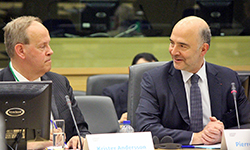 "There needs to be a greater focus on supporting growth and investment in the development of EU tax policy”. This was the key message of Krister Andersson, Chair of BusinessEurope’s Tax Policy Group, at the European Business Summit on 23 May in Brussels in a panel session entitled “EU Taxation Policy: Which impact on EU's attractiveness and competitiveness?" , which included interventions from European Commissioner Pierre Moscovici, Member of the European Parliament Alain Lamassoure, and Pascal Saint-Amans, Director of Tax Policy at the OECD. On the specific issue of digital tax, Andersson noted that an agreement on this is needed at international level through the Organisation for Economic Co-operation and Development (OECD) first, before implementation at EU-level.
"There needs to be a greater focus on supporting growth and investment in the development of EU tax policy”. This was the key message of Krister Andersson, Chair of BusinessEurope’s Tax Policy Group, at the European Business Summit on 23 May in Brussels in a panel session entitled “EU Taxation Policy: Which impact on EU's attractiveness and competitiveness?" , which included interventions from European Commissioner Pierre Moscovici, Member of the European Parliament Alain Lamassoure, and Pascal Saint-Amans, Director of Tax Policy at the OECD. On the specific issue of digital tax, Andersson noted that an agreement on this is needed at international level through the Organisation for Economic Co-operation and Development (OECD) first, before implementation at EU-level.
![]() Contact: Pieter Baert
Contact: Pieter Baert
Promoting cybersecurity at the Digital Business World Congress
 Increasing connectivity and the growing intricacy of cyber-attacks are cause for action if citizens are to trust new technologies. No longer is this just about stealing individual's information or finances but threats are posed at our critical infrastructure and institutions that our society depends on. This message was delivered by Dr Kurt-Christian Scheel, Chair of BusinessEurope Digital Economy Taskforce, on Thursday 24 May at the Digital Business World Congress in Madrid. While Europe has begun its response through proposing its Cybersecurity Act, which if designed in a robust, industry-relevant and affordable manner, it should encourage all players in value chains to take cybersecurity more seriously. More could also be done by governments to make citizens more cyber-hygienic, Dr Scheel stated, adding that “greater importance should be placed on exploring policy avenues to counter industrial state-funded espionage of intellectual property and trade secrets.” While the Cybersecuirty Act is a good start, he highlighted that more needs to be done to counter global industrial state-funded espionage which is draining Gross Domestic Products (GDP), causing a loss of research and innovation and overall impacting Europe’s digital leadership.
Increasing connectivity and the growing intricacy of cyber-attacks are cause for action if citizens are to trust new technologies. No longer is this just about stealing individual's information or finances but threats are posed at our critical infrastructure and institutions that our society depends on. This message was delivered by Dr Kurt-Christian Scheel, Chair of BusinessEurope Digital Economy Taskforce, on Thursday 24 May at the Digital Business World Congress in Madrid. While Europe has begun its response through proposing its Cybersecurity Act, which if designed in a robust, industry-relevant and affordable manner, it should encourage all players in value chains to take cybersecurity more seriously. More could also be done by governments to make citizens more cyber-hygienic, Dr Scheel stated, adding that “greater importance should be placed on exploring policy avenues to counter industrial state-funded espionage of intellectual property and trade secrets.” While the Cybersecuirty Act is a good start, he highlighted that more needs to be done to counter global industrial state-funded espionage which is draining Gross Domestic Products (GDP), causing a loss of research and innovation and overall impacting Europe’s digital leadership.
![]() Contact: Patrick Grant
Contact: Patrick Grant
Company law package: a needed upgrade
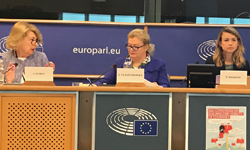 For decades European companies have been asking for clearer procedures to allow them to fully exercise their freedom of establishment in the EU. The recent company law package could be an opportunity to fill this gap. This proposal should be seen as an enabler to entrepreneurs across the EU willing to take the step and expand their business abroad. Although safeguards will be necessary to respect acquired rights of shareholders, creditors or employees, the proposal should not be seen as a panacea to pursue objectives which would be better achieved either by better enforcement or by actions in areas of EU law (e.g. tax, labour, etc.). These messages have been voiced by Joëlle Simon, Vice-Chair of the BusinessEurope Legal Affairs Committee at a Socialists&Democrats Group hearing in the European Parliament on the EU Company Law Package on 24 May.
For decades European companies have been asking for clearer procedures to allow them to fully exercise their freedom of establishment in the EU. The recent company law package could be an opportunity to fill this gap. This proposal should be seen as an enabler to entrepreneurs across the EU willing to take the step and expand their business abroad. Although safeguards will be necessary to respect acquired rights of shareholders, creditors or employees, the proposal should not be seen as a panacea to pursue objectives which would be better achieved either by better enforcement or by actions in areas of EU law (e.g. tax, labour, etc.). These messages have been voiced by Joëlle Simon, Vice-Chair of the BusinessEurope Legal Affairs Committee at a Socialists&Democrats Group hearing in the European Parliament on the EU Company Law Package on 24 May.
Contact: Pedro Oliveira
BusinessEurope updates members on patent law harmonisation discussions
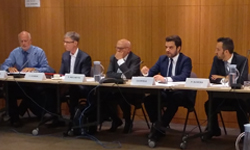 BusinessEurope held at its premises a roundtable for member federations on its international work regarding substantive harmonisation of patent laws on 18 May 2018. The aim of the event was to present and discuss the state of play of our work in the context of the Industry Trilateral Cooperation Platform with U.S. and Japanese industries on this topic as well as next steps. BusinessEurope stated that global harmonisation of patent laws will bring benefits in terms of legal certainty. Common rules will help reduce red tape and costs for companies that operate in multiple jurisdictions.
BusinessEurope held at its premises a roundtable for member federations on its international work regarding substantive harmonisation of patent laws on 18 May 2018. The aim of the event was to present and discuss the state of play of our work in the context of the Industry Trilateral Cooperation Platform with U.S. and Japanese industries on this topic as well as next steps. BusinessEurope stated that global harmonisation of patent laws will bring benefits in terms of legal certainty. Common rules will help reduce red tape and costs for companies that operate in multiple jurisdictions.
Contact: Ilias Konteas
Calendar
- 28-29 May: Competitiveness Council
- 29 May: MFF sector proposals I
- 1 June: U.S. decision on extending waver on duties on steel and aluminium for the EU and other allies
- 1-2 June: EYE2018 European Youth event
- 5 June: Brussels Economic Forum